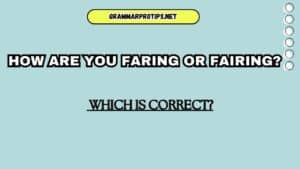When you ask someone, “How are you faring?”, you are inquiring about their health, well-being, condition, situation, experience, or progress.
On the other hand, fairing is not related to a person’s life or state it belongs to the world of aerodynamics, vehicles, and bodywork. Despite their similar spelling, faring and fairing serve very different purposes in English.
This article explains the difference between the two words, provides examples and contexts, and shows you how to use each correctly in emails, conversations, and technical discussions.
Correct vs Incorrect Word Usage
- ✅ Correct phrase: “How are you faring?”
- ❌ Incorrect phrase: “How are you fairing?”
The mistake happens because faring and fairing sound the same (they are homophones). However, their meanings and uses are not interchangeable. Let’s explore both.
What Does Faring Mean?
Faring comes from the verb “to fare”, which means to get along, experience, or progress in life or in a given situation.
- Verb (faring usage): It indicates how someone is coping, managing, or progressing.
For example:
- “How are you faring at your new job?”
- “During the storm, the villagers were not faring well.”
- “I’m glad to hear you’re faring better after your surgery.”
In British English, this expression is still fairly common, especially in polite or formal conversations.
Also Read: Assonance vs Rhyme: What’s the Difference?
Examples of “How Are You Faring?” in Context
Example 1: An Email Check-in
Subject: Checking in on You
Hi James,
I just wanted to reach out and ask, how are you faring these days? With all the changes at work, I imagine it’s been a challenging few weeks. If you ever need support or just someone to talk to, don’t hesitate to reach out.
Best,
Samantha
Example 2: Polite Conversation
- Anna: “It’s been such a long time since we last met! How are you faring?”
- Mark: “Thanks for asking. I’ve been progressing slowly with my studies, but overall, I’m not faring too badly.”
Example 3: Expressing Difficulty
- “After the financial setback, John admitted, ‘I’m not faring well.’”
- This mirrors alternatives such as “How are you doing?”, “How’s it going?”, or “How are you holding up?”
Synonyms for “How Are You Faring?”
If you want to avoid repetition, here are some synonyms and polite alternatives:
- “How are you doing?”
- “How’s it going?”
- “How are you holding up?”
- “How’s everything with you?”
- “How are things on your end?”
These expressions all carry the same intent: to check on someone’s well-being, health, and condition.
Also Read: Igniter or Ignitor: Which Spelling Should You Choose?
What Does Fairing Mean?
Fairing has nothing to do with people’s lives. Instead, it refers to a smooth covering or structure added to vehicles, airplanes, ships, or motorcycles to improve aerodynamics.
- Noun (fairing usage): A fairing is a streamlined bodywork component designed for drag reduction, wind resistance control, and streamlining performance.
In simpler terms, fairings are panels or shells that help a machine move faster and more efficiently through the air or water.
Fairing in Aerodynamics & Engineering
Here are some typical examples of fairings:
- Airplane Fairing: A smooth structure that reduces drag around landing gear or joints.
- Motorcycle Fairing: The side fairings and front bodywork that protect the rider and improve wind resistance.
- Car or Ship Fairing: Structural coverings that help with streamlining and drag reduction.
Examples of Fairing Usage in Context
- Motorcycle Example:
- “The new Ducati model comes with extended side fairings to improve aerodynamics.”
- Airplane Example:
- “Engineers installed a landing gear fairing to reduce drag and enhance fuel efficiency.”
- Ship Example:
- “The vessel’s hull was fitted with a bulbous bow fairing to streamline water flow.”
- Car Example:
- “The prototype car includes custom fairings to improve performance during high-speed testing.”
Faring vs Fairing: A Quick Comparison
| Aspect | Faring | Fairing |
|---|---|---|
| Part of Speech | Verb form of “to fare” | Noun (technical term) |
| Meaning | Managing, progressing, experiencing life | Aerodynamic covering or structure |
| Usage Context | Health, well-being, condition, situation | Vehicles: airplane, motorcycle, car, ship |
| Example | “How are you faring?” | “The motorcycle’s side fairings reduce drag.” |
| Common Mistake | Correct in greetings | Incorrect in greetings |
Language Precision in Context
Using the wrong form “How are you fairing?” is a common English mistake. While most people may still understand your intention, it gives the impression of inaccuracy. In academic, professional, or polite/formal expressions, such an error stands out.
This is why paying attention to the differences in spelling and meaning is important. Choosing the right word ensures clarity and shows language precision in context.
British English Usage
In British English, the phrase “How are you faring?” is seen as a polite alternative to everyday phrases like “How are you doing?” or “How’s it going?”.
While in American English, the word faring may sound slightly old-fashioned, it still appears in formal writing, literature, and official communication.
Also Read: Requester vs Requestor: What’s The Proper Choice?
Why the Confusion Happens
The confusion arises because:
- Both words are pronounced the same.
- Spellcheckers may not always catch the difference if you type quickly.
- People assume “fairing” is just a variant spelling of “faring.”
But remember:
- Faring = People’s well-being and progress.
- Fairing = Vehicles and aerodynamics.
Practical Scenarios
Scenario 1: Workplace Email (Correct Use of Faring)
Subject: Project Updates
Hi Olivia,
I hope this message finds you well. How are you faring with the new project timeline? If there’s anything I can do to support, please let me know.
Warm regards,
David
Scenario 2: Technical Report (Correct Use of Fairing)
Title: Drag Reduction on Commercial Aircraft
The addition of landing gear fairings provided significant drag reduction during wind tunnel tests. These streamlined bodywork components play a crucial role in aerodynamics, ensuring smoother airflow around the aircraft’s structure.
Scenario 3: Polite Chat (British English Style)
- Emma: “It’s been ages since I last saw you! How are you faring in your new city?”
- Daniel: “I’m adjusting well. The experience has been exciting, though a bit overwhelming.”
Final Thoughts
The key difference lies in context:
- Use faring when talking about someone’s health, well-being, condition, situation, experience, or progress.
- Use fairing when referring to aerodynamics, wind resistance, streamlining, drag reduction, or vehicle bodywork like on a ship, car, airplane, or motorcycle.
So the next time you write or speak, remember:
- Correct phrase: “How are you faring?”
- Incorrect phrase: “How are you fairing?”
By mastering this distinction, you’ll avoid one of the most common English mistakes (faring vs fairing grammar) and communicate with greater clarity, precision, and professionalism.
Read more knowledgeable blogs on Grammar Pro Tips

Sienna Mauldon is a passionate writer and grammar expert. On her blog, she shares easy-to-follow guides to help readers master grammar rules and improve their writing. With a love for language and teaching, Sienna makes grammar simple and fun for everyone, from beginners to experienced writers.








